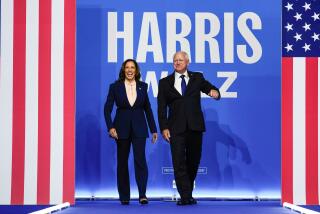Vilsack exits presidential race
Tom Vilsack’s abrupt departure from the presidential race Friday underscores the indispensable role of money in the contest, as well as an attention gap between voters and political insiders.
Less than three months after becoming the first major Democratic candidate to formally announce his bid, Vilsack reluctantly made his exit at a Des Moines news conference.
“It is money and only money that is the reason we are leaving,” the former Iowa governor said. He had begun mulling a pullout several days before making his final decision Thursday, in the face of a severe cash crunch.
“I came up against something for the time in my life that hard work and effort couldn’t overcome,” Vilsack said. “I just couldn’t work any harder, couldn’t give it enough.”
His withdrawal leaves a Democratic field dominated by Sens. Hillary Rodham Clinton of New York and Barack Obama of Illinois -- and, to a lesser degree, former Sen. John Edwards of North Carolina. Several other candidates are fighting, as Vilsack did, to elbow their way into that top tier.
“In a normal year, a successful governor -- no less from Iowa, the first voting state -- would be an ideal candidate,” said Thomas Schaller, a University of Maryland expert on the presidential nominating process. “But this is a cycle where you have these two titans in Obama and Clinton, and they’re sucking all the oxygen and the majority of money out of the race before it’s even begun.”
Vilsack’s announcement came on the same day a new national poll showed that about three in 10 Democrats were paying attention to the presidential race, and fewer than half volunteered a candidate they might support. The survey showed Clinton and Obama running far ahead of the party pack.
“Despite the accelerated campaign, it’s not something that’s really engaging the public to any great extent,” said Andrew Kohut, director of the Pew Research Center for the People & the Press, which conducted the poll.
But at this stage of the contest the candidates are playing to a much narrower audience -- courting key activists and donors. It was in the latter category in particular that Vilsack was lagging far behind. He reported raising $1.1 million between his November campaign launch and the end of the year -- less than Obama raised in a single night this week in Beverly Hills.
In a conference call with reporters after his Friday announcement, Vilsack said he had been contemplating his exit for some time. He pressed on with his candidacy, however, delivering a speech on energy independence in San Francisco, appearing on “The Tonight Show With Jay Leno” and drawing favorable reviews for his performance Wednesday at a candidate’s forum in Carson City, Nev. He emerged as an especially vocal critic of the war in Iraq.
But financial realities -- and especially the prospect of going deeply into debt -- weighed heavily on Vilsack.
“You can spin whether $20 million can compete with $100 million,” Vilsack’s campaign manager, Craig Varoga, said of the financial disadvantage the ex-governor probably would have faced. “But you cannot spin solvency.
“So we just made a very responsible fiscal decision.”
The departure of Vilsack is not expected to greatly alter the race. He trailed in polls even in his home state, which is scheduled to hold its precinct caucuses Jan. 14. But his absence will free up donors and Iowa activists whose expertise is highly valued; after Vilsack’s announcement, his erstwhile rivals wasted no time.
“There’s nobody, with the possible exception of John Edwards, who has anything remotely resembling a statewide organization,” said Gordon Fischer, a former chairman of the Iowa Democratic Party who received a call Friday from Obama.
“It really opens up the state in a way it wasn’t before.”
Unhappy with all the attention showered on Iowa -- as well as New Hampshire, which hosts the nation’s first primary -- several states have moved to push up their nominating contests. That may create what amounts to a national primary Feb. 5, probably including California and several other big states. That, in turn, has put a premium on the kind of early, frenzied fundraising that Vilsack lamented Friday.
“This process has become a great deal about money,” he said. “A lot of money.”
His exit marks the third departure of a serious contender from the Democratic race in the last few months. Sen. Evan Bayh of Indiana -- who for years inched toward an all-out run for the White House -- decided in December that he could not compete as an underdog in today’s campaign environment. Former Virginia Gov. Mark Warner announced in October that he was abandoning his presidential effort, citing family considerations.
Speaking to reporters Friday in a firm if somber tone, Vilsack said it was too early to consider endorsing another candidate and brushed aside a question about whether he would be interested in being considered for vice president, as he was in 2004.
“To be honest with you,” Vilsack said, “that’s about the furthest thing from my mind today.”
More to Read
Get the L.A. Times Politics newsletter
Deeply reported insights into legislation, politics and policy from Sacramento, Washington and beyond. In your inbox three times per week.
You may occasionally receive promotional content from the Los Angeles Times.











